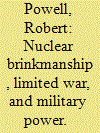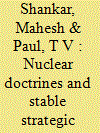| Srl | Item |
| 1 |
ID:
140351


|
|
|
|
|
| Summary/Abstract |
An open question in nuclear deterrence theory is whether and how the balance of military power affects the dynamics of escalation. The balance of military strength plays virtually no role in standard accounts of brinkmanship. But this is largely by assumption and seems incompatible with an apparent trade-off between power and risk that decision makers have faced in some actual crises. This paper incorporates this trade-off in a modified model of nuclear brinkmanship. A main result is that the more likely the balance of resolve is to favor a defender, the less military power a challenger brings to bear. The model also formalizes the stability-instability paradox, showing that a less stable strategic balance, that is, a sharper trade-off between power and risk, makes conflict at high levels of violence less likely but conflict at lower levels more likely. The analysis also helps explain the incentives different states have to adopt different nuclear doctrines and force postures.
|
|
|
|
|
|
|
|
|
|
|
|
|
|
|
|
| 2 |
ID:
145262


|
|
|
|
|
| Summary/Abstract |
This article offers a discussion of nuclear doctrines and their significance for war, peace and stability between nuclear-armed states. The cases of India and Pakistan are analysed to show the challenges these states have faced in articulating and implementing a proper nuclear doctrine, and the implications of this for nuclear stability in the region. We argue that both the Indian and Pakistani doctrines and postures are problematic from a regional security perspective because they are either ambiguous about how to address crucial deterrence related issues, and/or demonstrate a severe mismatch between the security problems and goals they are designed to deal with, and the doctrines that conceptualize and operationalize the role of nuclear weapons in grand strategy. Consequently, as both India's and Pakistan's nuclear doctrines and postures evolve, the risks of a spiralling nuclear arms race in the subcontinent are likely to increase without a reassessment of doctrinal issues in New Delhi and Islamabad. A case is made for more clarity and less ambition from both sides in reconceptualizing their nuclear doctrines. We conclude, however, that owing to the contrasting barriers to doctrinal reorientation in each country, the likelihood of such changes being made—and the ease with which they can be made—is greater in India than in Pakistan.
|
|
|
|
|
|
|
|
|
|
|
|
|
|
|
|